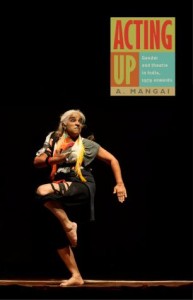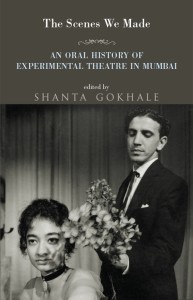World Theatre Day, 27 March 2016
It was World Theatre Day yesterday— 27 March 2016. I missed it. Nevertheless I am posting a short note about a couple of books published recently about theatre in India that are worth noting.
- A. Mangai Acting Up: Gender and theatre in India, 1979 onwards Leftword, New Delhi, 2015. Hb. pp. 278
 Rs.495 : It is an astounding book written by a feminist who has been closely associated with Indian theatre for more than thirty years. It is an astonishing book not just for the breadth and variety of theatre that exists in India but also for the fine analysis. It is by a woman practitioner who understands the nuances as well as the academic discourses, the historical and political context of theatre in post-Independent India and the influence of women’s movements in performance and how more recent performances have challenged heteronormative, patriarchal structures. For this book Mangai interviewed many women theatre artistes. She has also included accounts of performances, plays, troupes and fascinating bits of information such as reference to Neera Adarkar’s work on highlighting little-known aspects of women in theatre history. “For instance, Adarkar refers to an all-female theatre company called Belgaonkar Stree Sangeet Mandali founded by a prostitute called Ekamba, which performed a social play called Dandadhari: a pro-Tilak play that cautiously addressed the issue of widow remarriage. It even featured Bal Gangadhar Tilak and Gopal Krishna Gokhale as characters. But this did not hold back the critics: the women who played these famous men were viewed as ‘ugly, cheap, and abnormal’!” ( p.138) It is a path-breaking book for its encyclopaedic knowledge about theatre in India. Every time you read it you discover something more.
Rs.495 : It is an astounding book written by a feminist who has been closely associated with Indian theatre for more than thirty years. It is an astonishing book not just for the breadth and variety of theatre that exists in India but also for the fine analysis. It is by a woman practitioner who understands the nuances as well as the academic discourses, the historical and political context of theatre in post-Independent India and the influence of women’s movements in performance and how more recent performances have challenged heteronormative, patriarchal structures. For this book Mangai interviewed many women theatre artistes. She has also included accounts of performances, plays, troupes and fascinating bits of information such as reference to Neera Adarkar’s work on highlighting little-known aspects of women in theatre history. “For instance, Adarkar refers to an all-female theatre company called Belgaonkar Stree Sangeet Mandali founded by a prostitute called Ekamba, which performed a social play called Dandadhari: a pro-Tilak play that cautiously addressed the issue of widow remarriage. It even featured Bal Gangadhar Tilak and Gopal Krishna Gokhale as characters. But this did not hold back the critics: the women who played these famous men were viewed as ‘ugly, cheap, and abnormal’!” ( p.138) It is a path-breaking book for its encyclopaedic knowledge about theatre in India. Every time you read it you discover something more. - The Scenes We Made: An Oral History of Experimental Theatre in Mumbai (Edited by Shanta Gokhale) Speaking Tiger, New Delhi, 2016. Hb. pp. 210 Rs. 599: Mumbai theatre has been and continues to be with the
 establishment of Prithvi Theatre an influential space in India. This particular book focuses upon three spaces — Bhulabhai Desai Memorial Institute, Walchand Terrace and Chhabildas School Hall. But the structure of the book is interesting since these are oral history accounts of noted theatre personalities like Ebrahim Alkazi, Vijaya Mehta, Satayadev Dubey, Sulabha Deshpande, Naseeruddin Shah and Ratna Pathak Shah. It is an incredible book for it plunges you straightaway into Mumbai of 1950s and brings it to the present. What comes across is the very close knit community the theatre artists formed and continue to do so. Shockingly the brilliant introduction by Girish Karnad is not mentioned on the cover or in the list of contents. It contextualises the theatre movement with a superb overview of the Indian playwrights inheritance from the West and their attempts at experimenting with the folk form in a modern play. Girish Karnad says “Could one, we kept asking, write a contemporary play, sensitive to modern concerns, using the conventions of medieval theatre, such as masks, mime, monologues and songs, without becoming regressive in content?” ( p.xv) It is a book I treasure.
establishment of Prithvi Theatre an influential space in India. This particular book focuses upon three spaces — Bhulabhai Desai Memorial Institute, Walchand Terrace and Chhabildas School Hall. But the structure of the book is interesting since these are oral history accounts of noted theatre personalities like Ebrahim Alkazi, Vijaya Mehta, Satayadev Dubey, Sulabha Deshpande, Naseeruddin Shah and Ratna Pathak Shah. It is an incredible book for it plunges you straightaway into Mumbai of 1950s and brings it to the present. What comes across is the very close knit community the theatre artists formed and continue to do so. Shockingly the brilliant introduction by Girish Karnad is not mentioned on the cover or in the list of contents. It contextualises the theatre movement with a superb overview of the Indian playwrights inheritance from the West and their attempts at experimenting with the folk form in a modern play. Girish Karnad says “Could one, we kept asking, write a contemporary play, sensitive to modern concerns, using the conventions of medieval theatre, such as masks, mime, monologues and songs, without becoming regressive in content?” ( p.xv) It is a book I treasure.
But the book I truly am waiting for is noted theatre person and publisher, Sudhanva Deshpande, writing about theatre. Some years ago as he sat by his father’s sickbed, the noted Marathi playwright, G. P. Deshpande, Sudhanva wrote a series of long Facebook posts interweaving GPD’s significant contribution to Indian theatre with an incredible account of the theatre movement. If published albeit slightly expanded this firsthand experience of being part of Indian theatre would be an invaluable contribution to theatre.
28 March 2016
